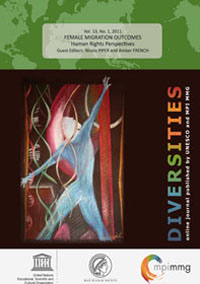Measuring Women’s Empowerment through Migration
by Amie Gaye and Shreyasi Jha (United Nations Development Programme, Statistics Unit)
To cite this article: Gaye, A., & Jha, S. (2011). Measuring Women’s Empowerment through Migration. Diversities, 13(1), 49–66. https://doi.org/10.58002/znjz-qa20
Currently, nearly half of international migrants are women, and evidence suggests that migration flows and their impacts are strongly gendered. However, there is a striking lack of quantitative analysis of international migration’s impact on gender. This paper attempts to examine the challenges in cross-national measurement of women’s empowerment through migration as a contribution to an informed policy debate around gender, migration and empowerment. Since the focus of this paper is on identifying challenges in quantitative measurement of women’s empowerment, we use individual-level data from the Luxemburg Income Study (LIS) to examine migrant women’s socio-economic characteristics. Data on educational attainment is used as proxy for social empowerment, while economic empowerment is measured using individual-level data on migrant’s occupation, job status, property ownership and net wage. Although aggregate data on female migration is essential to improve our understanding of cross-country differences in aspects of women’s migration, this paper emphasizes the need for more longitudinal data to identify barriers to women’s empowerment in destination and origin countries. The paper makes several forward-looking conclusions that summarize the major findings and links them to data and measurement issues that need to be addressed in future research.
|
